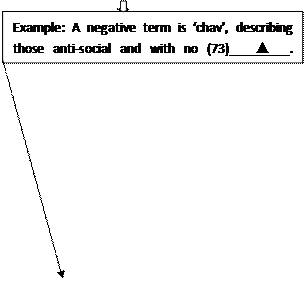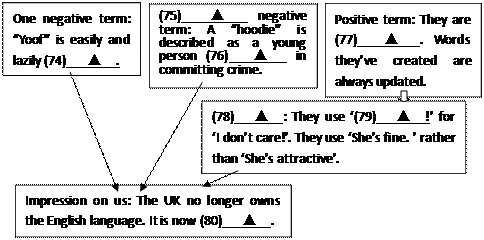
科目: 來源:不詳 題型:完形填空
查看答案和解析>>
科目: 來源:不詳 題型:完形填空
| A.What did you say? |
| B.I’m a total stranger here. |
| C.You can’t miss it |
| D.I beg your pardon? |
查看答案和解析>>
科目: 來源:不詳 題型:完形填空
 |
|
|
 | |||
 | |||


 ━━━━━━━━━━━━━━━━━━━━━━━━
━━━━━━━━━━━━━━━━━━━━━━━━ |
查看答案和解析>>
科目: 來源:不詳 題型:完形填空
| 36. | A. conversation | B. difficulty | C. accident | D. quarrel |
| 37. | A. paying | B. caring | C. calling | D. looking |
| 38. | A. left | B. offered | C. read | D. discovered |
| 39. | A. although | B. as | C. when | D. if |
| 40. | A. other | B. empty | C. safe | D. different |
| 41. | A. sad | B. strange | C. amazing | D. perfect |
| 42. | A. for | B. to | C. from | D. by |
| 43. | A. seizing | B. holding | C. keeping | D. grasping |
| 44. | A. spot | B. stair | C. area | D. home |
| 45. | A. firm | B. proud | C. cold | D. soft |
| 46. | A. walked | B. turned | C. decided | D. woke |
| 47. | A. question | B. shock | C. regret | D. upset |
| 48. | A. harmful | B. special | C. wrong | D. right |
| 49. | A. pulled | B. caught | C. sent | D. protected |
| 50. | A. quietly | B. tightly | C. strongly | D. seriously |
| 51. | A. disappeared | B. went | C. arrived | D. returned |
| 52. | A. failure | B. idea | C. loss | D. death |
| 53. | A. shocked | B. angry | C. happy | D. hopeless |
| 54. | A. task | B. time | C. favor | D. job |
| 55 | A. responsibility | B. sympathy | C. guilt | D. hurt |
查看答案和解析>>
科目: 來源:不詳 題型:完形填空
| A.Encourage your teen to relax. |
| B.The best thing is simply to be there. |
| C.They will only make the situation worse. |
| D.Exam stress can make some teens lose their appetite (食欲). |
查看答案和解析>>
科目: 來源:不詳 題型:完形填空
查看答案和解析>>
科目: 來源:不詳 題型:閱讀理解
查看答案和解析>>
科目: 來源:不詳 題型:完形填空
查看答案和解析>>
科目: 來源:不詳 題型:完形填空
查看答案和解析>>
科目: 來源:不詳 題型:閱讀理解
| A.Observation is the best teacher. |
| B.Seeing is believing. |
| C.The outsider sees the most of the game. |
| D.It is not easy to gain money |
| A.My flower garden | B.Marvin helps to realize my dream |
| C.Love in Michigan | D.Money grows on trees |
| A.wasteful | B.tight | C.a(chǎn)bsurd | D.helpful |
| A.divorced when she was young | B.not caring for her kids any longer |
| C.a(chǎn)lone but not at all lonely | D.prouder with her garden than with her kids. |
查看答案和解析>>
湖北省互聯(lián)網(wǎng)違法和不良信息舉報平臺 | 網(wǎng)上有害信息舉報專區(qū) | 電信詐騙舉報專區(qū) | 涉歷史虛無主義有害信息舉報專區(qū) | 涉企侵權(quán)舉報專區(qū)
違法和不良信息舉報電話:027-86699610 舉報郵箱:58377363@163.com